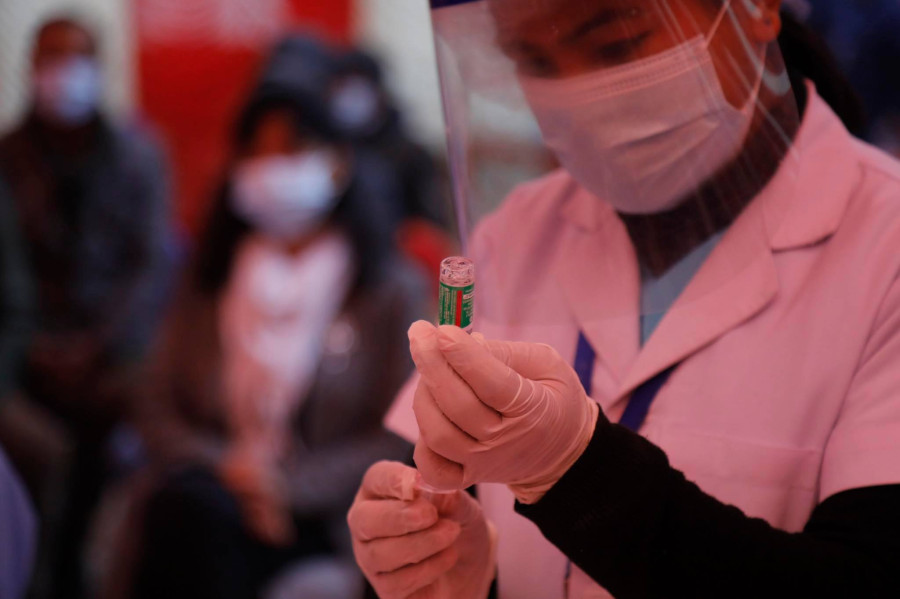Health
Essential workers to be immunised with Chinese vaccine from today
The jabs will be administered from 23 hospitals—19 in Kathmandu Valley and four in districts bordering China. Around 400,000 people have been targeted in this latest phase.
Arjun Poudel
Essential workers will be immunised from Wednesday with the Covid-19 vaccine provided by China under a grant assistance.
The Ministry of Health and Population said that all necessary preparations including the supply of the vaccine and orientation for health workers have been completed for the vaccination programme.
Dr Jhalak Gautam, chief of the National Immunisation Programme, told the Post that those who provide essential services defined by the government can take the jabs from designated hospitals.
Essential workers include postal and telephone service providers, public transportation workers, water supply and distribution staff, tourism sector—hotels and restaurants—employees, and workers engaged in production, sales and distribution of medicines, electricity supply, storage and transportation of consumer goods. Health workers who missed out in the first phase of vaccination that began on January 27 can also get the Chinese jabs.
Apart from those working in essential sectors defined by the government, the vaccine will be administered to businessmen and truck drivers who need to travel to China frequently.
Nepali students pursuing higher degrees in China but stuck in Nepal due to the pandemic will also get the jabs, according to Gautam.
China recently introduced vaccination passports for travellers to prove that they are free from the coronavirus infection. It has been reported that China is resuming visa processing for foreigners if they have been inoculated against the coronavirus with Chinese vaccines.
“Vaccines will be administered from 23 hospitals, 19 of them from Kathmandu Valley—14 in Kathmandu, three in Lalitpur and two in Bhaktapur,” added Gautam. “People of the targeted groups can take the jabs trom the Dhulikhel and Trishuli Hospital, Barhabise Hospital and District Hospital Rasuwa.”
Earlier, the Health Ministry had said that those in the target group would be vaccinated from 12 hospitals in Kathmandu Valley.
The Chinese vaccine will be administered at Bir Hospital, Paropakar Maternity and Women’s Hospital, Sukraraj Tropical and Infectious Disease Hospital, Civil Hospital, National Ayurveda Research and Training Centre, Nepal Medical College, Kathmandu Medical College, Tribhuvan University Teaching Hospital, Shahid Gangalal National Heart Centre, Birendra Hospital (Army Hospital), APF Hospital, Nepal Police Hospital, Om Hospital and Research Centre and Chhetrapati Free Clinic in Kathmandu.
Patan Hospital, KIST Medical College and Anandaban Hospital in Lalitpur; Bhaktapur Hospital and Nepal-Korea Friendship Municipality Hospital of Bhaktapur, Dhulikhel Hospital of Kavrepalanchok, Trishuli Hospital of Nuwakot, District Hospital Rasuwa and Barhabise Hospital of Sindhupalchok will provide the immunisation service.
The Health Ministry plans to extend the immunisation programmes to Barhabishe of Sindhupalchok and Dhunche of Rasuwa later.
China had given 800,000 doses of coronavirus vaccine, the BBIBP-CorV developed by Sinopharm, an affiliate of the state-backed pharmaceutical giant Sinopharm, in grant. The vaccines arrived in Kathmandu last Monday.
According to a report published in The Lancet, inactivated BBIBP-CorV Covid-19 vaccine is safe and well tolerated.
On December 30 last year, Sinopharm announced the vaccine's efficacy at 79 percent, which was lower than the 86 percent efficacy announced by the United Arab Emirates on December 9.
According to recent reports in The Washington Post , the United Arab Emirates, which was among the first countries to adopt Sinopharm vaccines, BBIBP-CorV is not adequately generating antibody response after two doses.
According to the paper, Walid Zaher, chief researcher for G42 Healthcare, which distributes the Sinopharm vaccine in the United Arab Emirates, told Dubai Eye Radio that a study was underway to give some people their third doses.
G42 Healthcare also coordinated Sinopharm’s Phase 3 clinical trials in the UAE and elsewhere in the Middle East.
Gautam said that essential workers between 18 and 59 years can get the vaccine in the drive.
Earlier, the Health Ministry had decided to provide the vaccine only to people between 40 and 59 years.
Unlike in the first and second phases of Nepal’s immunisation campaign against the coronavirus, the Chinese vaccine will not be administered from the district hospitals and the primary health centres.
Earlier, the ministry had planned to provide the jabs from the provincial hospitals, but Gautam said that for now there is no such plan.
In the first phase of the campaign, frontline health workers and others had been given the jabs from district hospitals and in the second phase, during which those above the age of 65 had been given the jabs, the campaign was expanded to primary health centres.
Nepal has so far been using Covishield, the vaccine developed by University of Oxford and the pharmaceutical giant AstraZeneca, manufactured by the Serum Institute of India.
After inoculating a little over 1.8 million people in two phases until March 15, Nepal’s vaccination drive remains suspended due to supply constraints.
Nepal launched its vaccination drive with the one million doses of Covishield that India had provided under a grant assistance.
Nepal then paid for 2 million doses, but the Serum Institute has supplied only a half of the ordered amount, with no clarity on when the remaining half will arrive. Nepal’s plan to buy an additional 5 million doses from the Serum Institute is currently in limbo.
Nepal has also received 348,000 doses of Covishield under the World Health Organisation-backed COVAX programme.
The Health Ministry said that the second dose will be given to those who got the first dose in the first phase of the immunisation campaign, from around 500,000 doses of Covishield vaccines in stock, from April 20 to 24.
Nepal has so far reported 278,470 cases of coronavirus infections and a death toll of 3,036.
The Health Ministry said that 260 people have been infected in the last 24 hours. Active cases stand at 1,979 throughout the country.




 8.43°C Kathmandu
8.43°C Kathmandu















